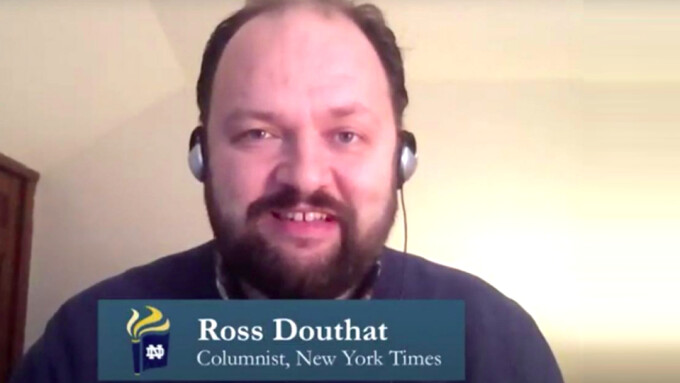NEW YORK — The New York Times published an opinion piece yesterday by staff columnist Ross Douthat advocating for a return to pre-1960s “inconsistencies and hypocrisies” about several social issues, including sexual expression.
Douthat’s proudly reactionary opinion piece, written in the form of an editorial, was titled “We Aren’t in Vegas Anymore” and subtitled “On Super Bowl Sunday and the Dark Side of Gambling.”
Although the main focus of Douthat’s sermonizing is gambling — prompted by ads broadcast during the Super Bowl on Sunday — he repeatedly pivots to sex, and sexual content, to back his claim that America’s “fatal impulse toward consistency” is a national “vice” and one of the forces “that unraveled the American social fabric between the 1960s and the 2020s.”
Shocked that gambling has escaped the designated — and easy-to-stigmatize and demonize — confines of Vegas and Atlantic City and is now everywhere via the internet, Douthat predicts a forthcoming “gambling addiction crisis" caused by “our unwillingness to live with inconsistencies and hypocrisies instead of ironing them out, our inability to take a cautious step or two down a slippery slope without tobogganing to the bottom.”
Exhibit A on Douthat's excited call for a return to “inconsistencies or hypocrisies” — what others would denounce as “unequal treatment under the law” — is what he calls “pornography.”
”With pornography,” he writes, ”the difficulty of identifying a perfectly consistent rule that would allow the publication of ‘Lolita’ but not Penthouse has led to a world where online porn doubles as sex education and it’s assumed that the internet will always be a sewer and we just have to live with it.”
For the New York Times staff columnist, access to “vices” — a blatantly religious term that made its way into civil law through late 19th-Century and early 20th-Century faith-based activism — should ideally go back to being part of a “contingent, somewhat irrational, arguably unconstitutional system.”
“Did it make perfect rational sense to have the betting regime of my youth, where a couple of American cities were gambling havens for accidental historical reasons?” Douthat asks. “Not really: If gambling is bad, it’s bad everywhere, and if it’s OK for Nevadans, why shouldn’t it be OK for everyone? And did it make constitutional sense for this arbitrary system to be partially propped up by a federal ban on state-sanctioned sports gambling? No, the Supreme Court decided in 2018, it does not.”
This admittedly hypocritical and arbitrary system, in Douthat’s view, “struck a useful balance, making gambling available without making it universal, encouraging Americans to treat the gambling experience as a holiday from the everyday, not seriously wicked but still a little bit shameful or indulgent — which is why it stays under the table, or in Vegas.”
"Part of what we’re witnessing from #MeToo-era feminism, for instance, is a backlash against the ruthless logic of an unregulated sexual marketplace and a quest for some organic form of social regulation, some new set of imperfect-but-still-useful scruples and taboos," he concludes.
Douthat ends by openly calling for a political and legal “reversal” of the post-1960s decisions that led to less inequality under the law.
The influential New York Times columnist even frames the #MeToo movement as a backlash against what he calls the post-1960s “unregulated sexual marketplace," and reduces it to a moralistic "quest for some organic form of social regulation, some new set of imperfect-but-still-useful scruples and taboos” — although others would argue that #MeToo stems from a demand for precisely the kind of consistency and fairness that Douthat dismisses as socially inconvenient.
To read “We Aren’t in Vegas Anymore,” visit the NYTimes.com.
Main Image: New York Times writer Ross Douthat during a 2021 video talk for a religious publication (Source: National Catholic Reporter video still)




